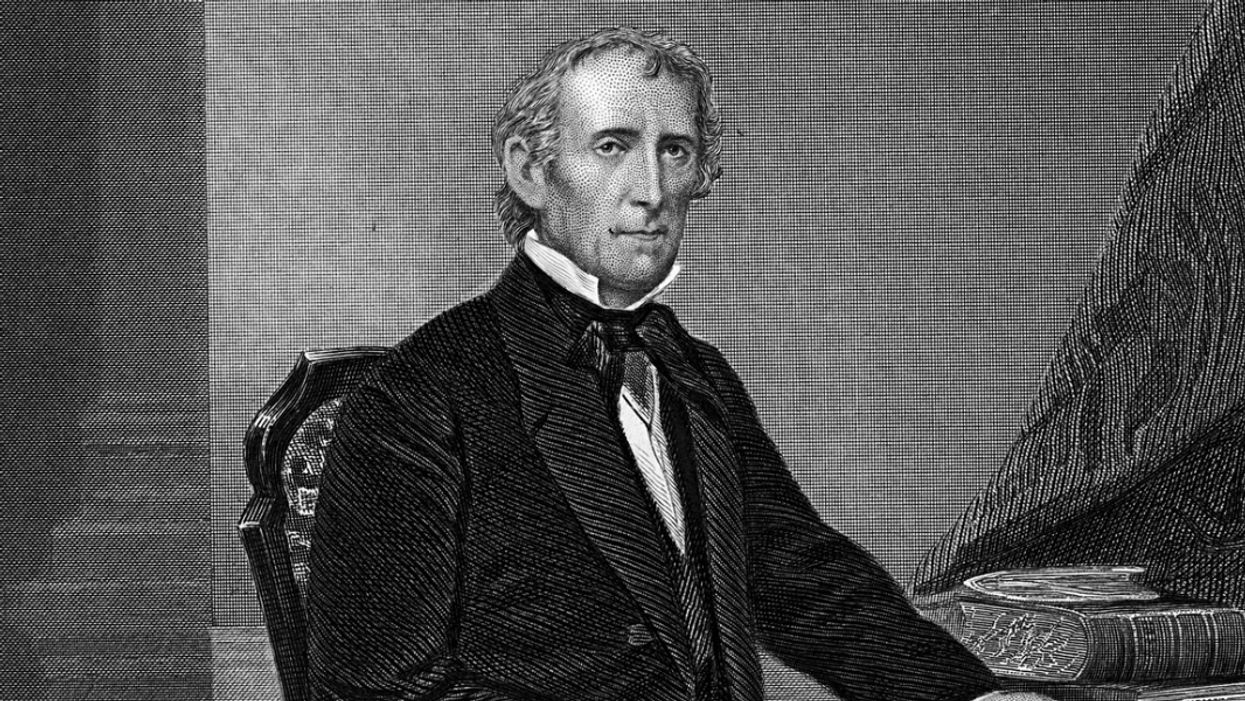Rabbi Charles E. Savenor serves as the Executive Director of Civic Spirit that provides training in civic education to faith based day schools.
When the USS Princeton set sail on February 28, 1844, it was supposed to be a celebration for both the ship and America’s commander in chief, President John Tyler. The 300 dignitaries in attendance were fascinated as much with this new state-of-the-art warship on the Potomac River as its cannon ironically called “the Peacemaker”. During the cruise the cannon exploded, killing members of Tyler’s cabinet and congress and torpedoing Tyler’s hopes of winning reelection.
This mishap was one of many that plagued Tyler’s administration. In fact, the circumstances surrounding his ascension to the presidency were considered an accident by some of his contemporaries.
The fate of America and its highest office was in a precarious situation 182 years ago. Exactly one month after the wet and cold inauguration of former war hero William Henry Harrison on March 4, 1841, the new president died from what is commonly believed to be pneumonia.
Since this was the first time a president passed away in office, a cloud of uncertainty emerged about what happens next. While America’s founding fathers had established provisions for such a scenario, it was not clear how to proceed. In essence, this was an accident waiting to happen. Regarding presidential succession, Article II, Section 1 of the Constitution states: “In Case of the Removal of the President from Office, or of his Death, Resignation, or Inability to discharge the Powers and Duties of the said Office, the Same shall devolve on the Vice President.” The debate centered on whether the vice president would fully assume the office or merely fulfill its responsibilities.
Despite the prevailing opinion of late President Harrison’s cabinet and the leadership on Capitol Hill that Tyler would essentially be the interim or acting president, the Vice President’s unequivocal position was that he would become President. Settling the immediate matter and setting a precedent for all time, he arranged to be sworn in without delay. His rivals may have not appreciated his expeditious approach, yet the 10th president maintained a peaceful transfer of power valued as a hallmark of American democracy.
Never fully accepting Tyler as president, his political rivals continually derided him with the label “His Accidency.” Despite Tyler’s determination not to be perceived as an accidental president, one of Tyler’s very first acts as president inadvertently created an uncomfortable conversation about the religious character of the United States. Proclaiming a national day of mourning for President Harrison, he opened: “When a Christian People feel themselves to be overtaken by a great public calamity…” Although recognizing that every citizen worships according to their own denomination, this Virginian’s introductory words were perceived to run counter to those of another famous citizen of his home state, namely Thomas Jefferson who penned the 1786 Virginia Statute of Religious Freedom that served as the basis for religious freedom in the Bill of Rights. What can be excused as a poor choice of words may have actually reflected Tyler’s beliefs about a stratified country.
Tyler’s overall political viewpoint embroils him in ongoing conflict not just with the opposition party, but also his own, the Whigs. His liberal use of the presidential veto power about matters most dear to Whigs led to Tyler being expelled from the party and later being the first president to face a resolution of impeachment. Even though he was not formally impeached, Tyler became a president without a party.
Tyler’s approach to slavery throughout his life was anything but accidental. According to historian Edward P. Crapol, the 10th president had a “lifelong ambivalence about the morality of the South’s peculiar institution,” yet fervently defended it. Born and raised in the land of Washington and Jefferson, he suffered from their same blind spots regarding equality and slavery.
Twenty years later, in 1861, Tyler’s commitment to slavery and white supremacy ultimately swayed him to forgo a reconciliation of the states and to support Virginia’s secession from the USA and subsequent entry into the Confederacy. Despite the odds, Tyler could have been a peacemaker at the Peace Conference of 1861, but his exit certainly torpedoed any last hopes of preserving the Union.
The final chapter of his long political career featured this former US President’s election to the Confederate House of Representatives. When Tyler died in January 1862, there was no proclamation from the White House. In fact, President Lincoln purposely did not order flags to be lowered to half-staff for this leader now branded a “traitor.”
By contrast, a little over 110 miles away in the new Confederate capital in Richmond, Virginia, Tyler received a prestigious send-off. However, it is important to note that his funeral marked the first and only instance that an American President was buried with a foreign flag – the Confederacy’s flag, without the familiar stars and stripes to which he originally pledged his loyalty.
President John Tyler has a complicated legacy. As much as he preserved the US government by establishing the “Tyler Precedent” for presidential succession later ratified with the 25th Amendment, he undermined his country by endorsing the secession of pro-slavery states.
Tyler’s presidency, remembered by few, represents a tragic, yet informative, chapter in American history about the battle for our country’s soul. The path towards a more perfect union will always require effort, collaboration, and civic education. To actualize the vision of a more perfect union, we must think and act like peacemakers who not just navigate troubled waters, but also build bridges for the sake of our future.




















